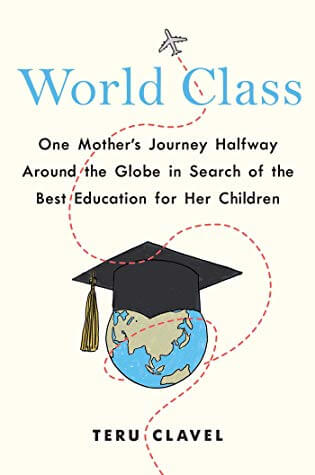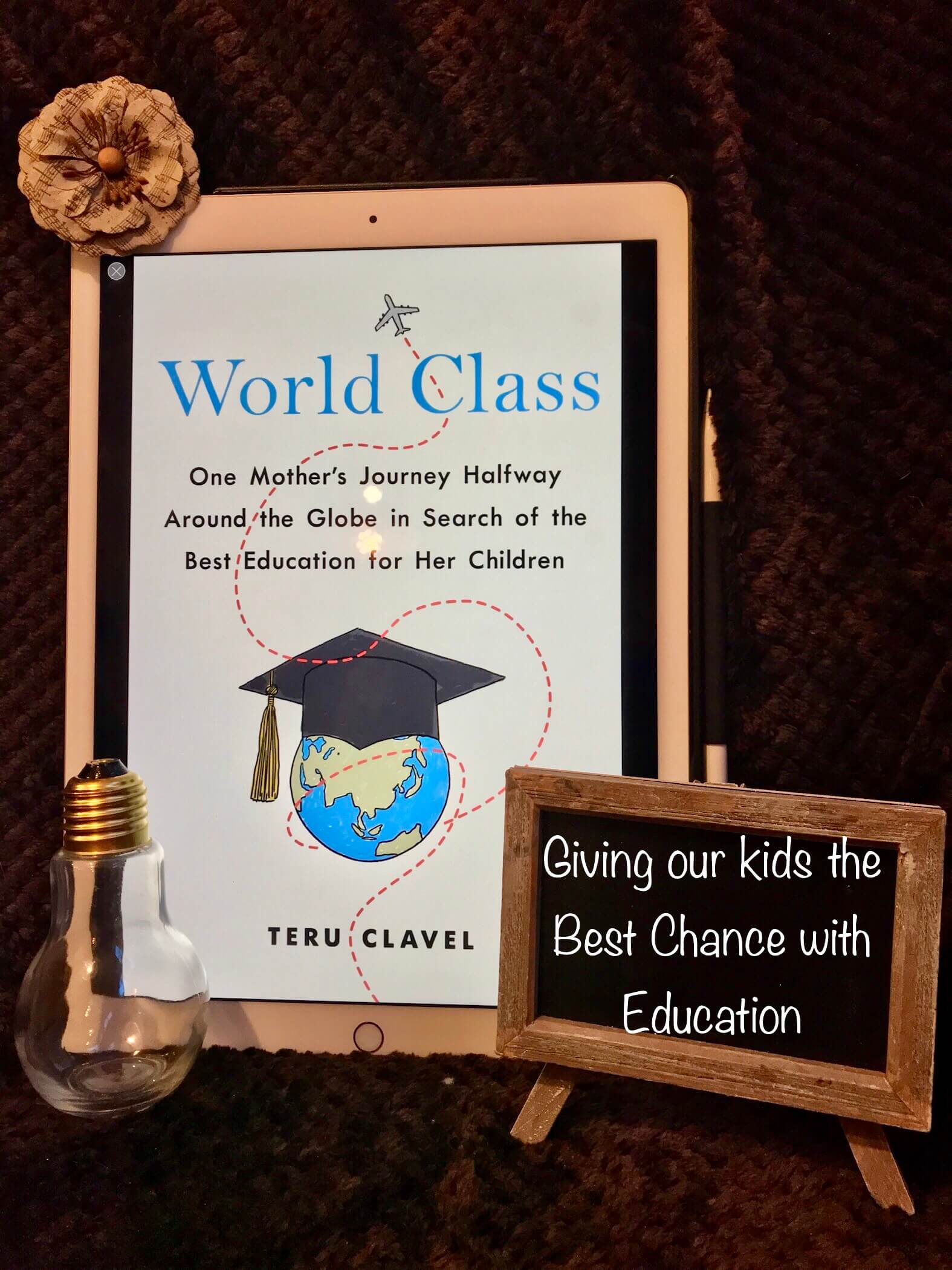World Class: A mother’s journey halfway around the globe in search of the best education for her children: No novel ever described itself better than this one by Teru Clavel. This is one of the first books that I requested on NetGalley when I signed up there. It talks about topics close to my heart, so you can imagine my excitement when I got approved to read it! Let’s read the synopsis before I tell you my book thoughts in detail.

When Teru Clavel had young children, the oldest barely two, she watched as her friends and fellow parents vied to secure a spot in the right New York City preschools. Following a gut feeling that a truly world-class education involves more than the privilege and ennui of elite private schools, Teru and her family moved to Asia, embarking on a ten-year-long journey through the public schools of Hong Kong, Shanghai, and Tokyo.
During this time, Teru discovered firsthand why students in China and Japan are far outpacing their American counterparts. In Hong Kong, her children’s school was nicknamed The Prison for its foreboding, austere facilities, yet her three-year-old loved his teachers and his nightly homework. In Shanghai, in a school without flush toilets, the students were kept late not out of punishment but to master the day’s lesson. In Tokyo, her children and their classmates were responsible for school chores, like preparing and serving school lunches—lunches that featured grilled fish, stewed vegetables, and miso soup, not hot dogs and french fries.
These schools were low-tech and bare-bones, with teachers who demanded obedience and order. Yet Teru was shocked to discover that her children thrived in these foreign and academically competitive cultures; they learned to be independent, self-confident, and resilient, and, above all, they developed a deep and abiding love of learning. The true culture shock came when Teru returned to the States and found their top-rated California school woefully ill-prepared to challenge her children. Her kids were passing, but the schools were failing them.
In this revelatory book, Teru shares what she learned during her decade in Asia, providing practical tips and takeaways to bring the best of Asia’s education and parenting philosophies into American homes and schools. Written with warmth and humor, World Class is an insightful guide to set your children on a path towards lifelong learning and success.
The Short Take – From Goodreads
If you have been following my blog, you would know that all my school education was in India and I moved to Canada for graduate studies. My passions led me to pursue a teaching degree and I recently spent an amazing time with junior high students during my final placements. The Canadian education system is similar in some ways to the United States, which Teru goes into detail in this book. The Indian education system shares similarities with China and Japan. Through World Class, I had the opportunity to glimpse education in other countries while making connections through my own experiences, guided by the eyes of a parent who wants to give the best to her children.
This is a well-researched book and it treads carefully on topics of funding for schools, teacher certification, role of community in helping children learn, mindsets, academic pressure, cultural norms and advocacy. Using research, interviews and personal experience, the reader is provided as much information as possible. The underlying story of Teru’s journey through different cultures and their school systems makes this an engaging read that imparts lots of facts, first-hand experiences, anecdotes as well as tips when thinking about one’s own children’s education. I took away so much from this book, bookmarking portions I would come back to when I am at that stage in life. This book also led to me and my partner to have some great discussions about education and what we would like for our children.
Anyone and everyone involved in education, whether as an administrator, teacher, or parent, should read this book. There is so much we can learn from other cultures and Teru does an amazing job of describing both sides of the coin, since no one method is perfect – everything comes with its pros and cons. Though some of the material is targeted at readers residing in the United States, most of it is general enough to be applied anywhere when looking for the right school for kids or even the kind of environment that would be most conducive at home to their upbringing.

The Long Take – Themes for Thought
When I first started teaching, I knew that the system was very different from the one that I had grown up in, back in India. I started to question what was it that differed in my education and the one that I was learning to provide.
On My Education in India
I will always credit my education in India for teaching me discipline and work ethics. It also put me in the habit of waking up early. School started at 7.30 am and was done by 2 pm. We had a lunch break around 11 am, when we could go to the canteen where they had food that felt like it came straight from home. I didn’t eat there often, but it was definitely a lovely treat, once in a while. The teachers were kind and would let me help out sometimes in distributing work, taking notebooks to their staff room, or performing errands. We were all a little scared of them but we loved them just the same. If one of our classmates was disrespectful, it wasn’t something to take pride in.
My high school had an extra emphasis on excellence. It had a high entrance average and that led to a competitive spirit in the classroom in a safe way. We had cleaning duties every week, where we cleaned the classroom with brooms, after the school was over. We kept each other accountable for keeping our surroundings clean. Sure, there was a janitor and cleaning staff, but we learned to appreciate and take care of the classroom that we called our ‘homeroom’, and never look down on any task.
I don’t remember my teachers adapting the curriculum for me or any of my friends. I do not remember them creating 3 different kinds of tests, like I did for my students during my final placement. I do remember them always being available to explain a concept over and over, if we wanted help. I remember getting reference books from them when I wanted to practice more. We did not use technology in the classrooms, it was early 2000s anyway, but we did learn computers. I remember the trips down to the basement of the school where the computer lab was. It was such a dark and cool place!
I had homework but it was never too much. It was something I could do on my own, once I got back from school. That was a habit that my parents cultivated in me – to complete everything that was a priority, first, and then spend the rest of the evening doing whatever I wanted. Eventually, I learned to work ahead of my class and prepare for it in advance.
I do not know where some of these habits come from, but I believe school had a major role to play in it. My parents were never at the school. It was a privilege to have them pick me up, and I wasn’t allowed to call them up or leave school grounds at any point of time, if I needed anything. If I fell sick, which happened a handful of times, there was a nurse’s room where I could rest, with the nurse checking in one me.
Everyone wore the same uniform. If you were a scholar, you got a token to wear (it was a special breast pocket for our winter coat). If you were a prefect (we voted for our student body), then you had a badge to show you were a person of importance.
I learned from World Class that a lot of these values are what the education systems throughout Asia have. Teachers are the paramount authority in these systems and parents have a right to their opinion, but the teacher knows the best, even when she is teaching 40 students in a class.

On Cultures and Languages
My education was primarily in English. My books were in English though we did not speak English at home. I remember during the elementary years, we had a class fund that was collected from the students. Since we were learning English, if anyone spoke in Hindi during English class, they would have to put a certain meagre amount in the class fund. We were too young to have the concept of pocket money and had to go ask our parents about it.
There is this beautiful article called “What Do You Lose When You Lose Your Language?” written in 1996. The author, Fisherman, talks about the loss of a language and what a language means to an individual who grew up with it and to the culture. He describes beautifully that “When a language is lost or taken away from a culture, the culture could no longer be expressed and handed down because the greetings, curses, praises, laws, literature, songs, riddles, proverbs, are lost as well. Losing a language is losing all those things that are essentially the way of life, thought, values and human reality.” Relate this to knowing a language and experiencing it in its own culture.
Teru emphasized the benefits of knowing more than one language and I heartily agree with her. That is the only way to truly experience other cultures. If I did not learn English where I did, I doubt I would have been drawn to English TV shows and movies where we started to get access to them. I had a whole new context of culture when I started seeing conversational English. I did learn French a bit as well, but that was from Grades 5-10 and we never had a steady teacher to teach it. I never picked it up the way I picked up English.
On Learning
I am a trained computing science teacher. I have a Masters in Computing and am currently working as a Data Analyst. I have read about computational thinking and the important tools that computers are, in teaching students how to access knowledge. Computing science teaches more than programming a computer – it teaches one to think deeply about the problem and plan out the solution, taking errors and best/worst scenarios into account. Does that not sound like something we should be teaching anyway?
Teru observes through her travels the focus of funding in schools in Asia and the USA. Speaking from observation in my area, I will say that currently, it feels like providing technology in the classrooms has become more important than teaching students the technical skills that will help them in the long run. I started learning basic things in computing, starting Grade 5. I have been to schools where computers isn’t even a subject – and the kids are in Grade 9 already. They are digital natives, having grown up with technology, but they truly don’t know how to use it, manipulate it to their own purposes. And maybe they don’t need to right now, but the avenues and flood gates that skills like computing open up once someone has grasped them is amazing.
Like Teru aptly says in World Class, instead of focusing on integrating technology into schools, we have to focus on the bigger picture of learning and building strong learners.

Like I mentioned in the beginning, the topic of this book is very close to my heart. So you can imagine this article has become a long one.
I am thankful to NetGalley, the publisher and, the author, Teru Clavel, for making this book available ahead of publication, and giving me the opportunity to experience her journey in education story. It has been a pleasure reading it and even after that, continuing to discuss it with my family. Since reviewing this book, I have connected with Teru and it has been an honor to know her. I look forward to sharing our discussion about World Class and education in the next article. 🙂
Meantime, I suggest you go read World Class. It is now available at all major retail stores. For audiobook fans, Teru recently recorded the audiobook as well. 🙂
Amazon Amazon (Kindle) Kobo
Let me and Teru know what you think! We can be found on Instagram and Twitter as @teruclavel and @_armedwithabook.
Cover image: Photo by Plush Design Studio on Unsplash

Be First to Comment